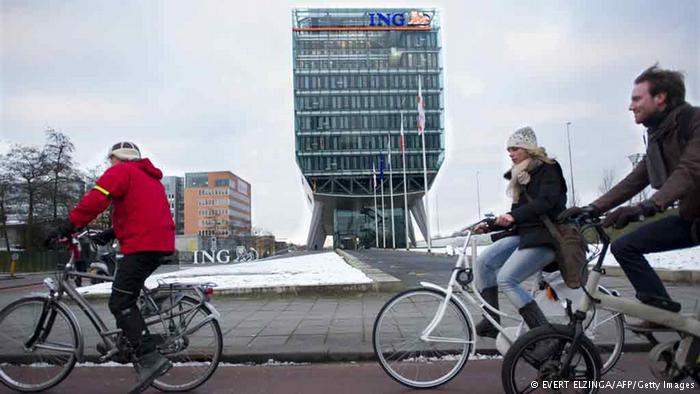Now it`s ING`s turn. The Amsterdam-headquartered multinational (its HQ building is pictured at top) is one of the world`s biggest banks, with more than 52,000 employees offering banking services to clients in over 40 countries.
On Monday, ING announced a "strategy update" involving a reduction of around 7,000 jobs between now and 2021, "mostly in Belgium and the Netherlands," according to the company`s website. The restructuring aims to reduce ING`s annual cost burden by about 900 million euros by 2021.
Digital finance
ING`s "strategy update" involves more than just slashing jobs. The company also announced an investment of 800 million euros in "continued digital transformation." Among big multinational banks, ING has been especially enthusiastic in moving toward online banking.
"Customers are increasingly digital and bank with us more and more through mobile devices," said Ralph Hamers, CEO of ING, in a statement. "Their needs and expectations are the same, all over the world... In order to continue to lead in digital banking, we need to offer a better customer experience."
At the same time, Hamers said, "banks are confronted with continuous regulatory burden and a prolonged period of ultra-low interest rates. These factors put pressure on the returns which are necessary to fund growth and investments, and cover our cost of capital."
Standardization
ING`s response to the pressures it faces - pressures also faced by Commerzbank and other rivals, including Deutsche Bank, whose share price is presently under attack by speculators - will include "starting a path of convergence towards one digital banking platform," CEO Hamers said. "Infrastructure, data and support functions are intended to be standardised across countries and business lines."
In other words, ING intends to improve the efficiency of its back-office functions and digital systems by reducing needless duplication.
In Germany, where ING has no physical bank branches, the company intends to enhance its digital banking platform with an "omnichannel approach" - which according to ING spokesperson Diederik Heinink means the customer should have "exactly the same experience, whatever the channel through which he comes into contact with ING," whether that be by phone, email, or Website: "The emphasis is on convenience and ease-of-use."
Is Europe overbanked?
Although the slew of banks cutting back on employee numbers in recent months have tended to cite regulatory burdens and low interest rates as reasons for reducing their head-counts, a more basic reason may be that too many banks are chasing a limited number of willing borrowers in Europe.
That`s the view taken in a report published in June 2014 by an Advisory Scientific Committee to the European Systemic Risk Board (ESRB). ESRB is part of the European System of Financial Supervision set up in the wake of the 2007-2008 financial crisis.
The ESRB report, entitled "Is Europe Overbanked?", said banks have caused "overleveraging," or excessive private debt by over-lending, and many businesses and households now want to "deleverage," or reduce their debt burdens.
The report - well worth a read for banking nerds - proposed a series of policy options to curb the problem in future. One proposal was for Europe`s governments to remove the preferential tax treatment of debt compared to equity. This policy proposal has been put forward by many economists in recent years, but it hasn`t yet been implemented by European legislators.
Curbing over-indebtedness
Adair Turner, former head of the UK Financial Services Authority and current chairman of the Institute for New Economic Thinking, has diagnosed Europe`s most acute economic problem as over-indebtedness affecting households and governments, and has proposed "overt monetary finance" as the solution. That would entail European Central Bank provision of debt-free new money to EU governments, in carefully calibrated annual amounts decided independently by the ECB`s monetary policy committee. That would help governments keep public debt burdens in check.
Moreover, as that debt-free money goes into circulation via government spending, it would not only generate new jobs; in addition, consumers would naturally use part of their new debt-unencumbered earnings to repay some of their outstanding debts, Turner has argued.
Turner`s proposal is in part motivated by the empirical observation that Europeans` willingness to take on fresh debt on a net basis - and thereby fund increased economic demand - has been weak in recent years. Less new debt means less total spending, and therefore less consumer demand and fewer jobs.
2015 was the first year in which total lending increased to the non-financial private sector - i.e. to households and non-financial corporations - after six consecutive years of decreases. That`s according to a recent report entitled "The trend reversal of the private credit market in the EU," written by Roberto Musmeci for the European Credit Research Institute at the Centre for European Policy Studies.
Deleveraging
"We`re in a deleveraging period," Musmeci told DW. "The question is whether that`s more a demand-side or a supply-side problem - so, are people reluctant to borrow, or are banks reluctant to lend?"
More work needs to be done to understand the bottlenecks in European credit markets, he said.
Even in 2015, "total loans granted to non-financial corporations in the EU decreased in real terms for the seventh consecutive year," Musmeci found.
But total credit granted increased in 2015 despite the reticence of companies to borrow more, because households got deeper into debt, "driven by the expansion in the consumer and housing sectors" in many EU countries, according to Musmeci.
That should cheer up ECB chief Mario Draghi, who for years has been trying to stimulate more consumer borrowing by means of ECB`s ultra-low interest rate policy. Whether households getting deeper into debt is good for the economy - or for families - in the long run is, however, an open question.
More about:
















































